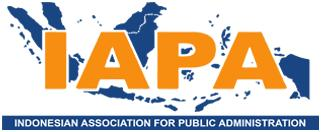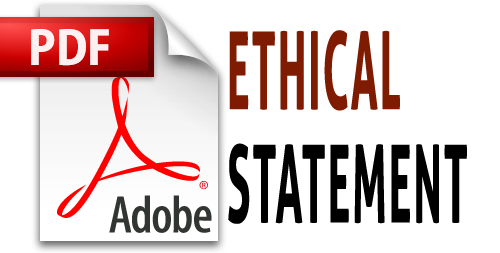Evaluation of the Effectiveness of SEHATI Innovation in Improving the Efficiency of Halal Certification for Micro and Small Enterprises in Indonesia
Abstrak
This study aimed to evaluate the effectiveness of the SEHATI (Free and Fast Halal Certification for Micro and Small Businesses) service innovation in improving the efficiency of the halal certification process in Indonesia. The main issue raised is the low efficiency of time, cost, and access to halal certification services, especially for Micro and Small Businesses (UMK). By using a mixed method approach and convergent parallel design, quantitative data was collected through a survey of 71 UMK actors, while qualitative data was obtained through interviews with BPJPH, LPH, and PPH assistants. The results of the analysis showed that time efficiency, cost efficiency, process accessibility, and flexibility do not have a significant effect on service satisfaction. At the same time, qualitative findings reveal various obstacles such as limited digital literacy, hidden costs, and inefficiencies in the field verification process. Although SEHATI has brought about change through digitalization and self-declaration, its implementation has not been fully effective. SEHATI is a strategic innovation with the potential to improve the efficiency of halal certification, yet its implementation still requires improvements in the aspects of assistance, system simplicity, and digital infrastructure so that its benefits are felt evenly and sustainably by MSME actors.
Kata Kunci
Teks Lengkap:
PDF (English)Referensi
Alkaf, A., Yusliza, M. Y. and Saputra, J. (2021) ‘A Review of Work Effectiveness and Efficiency , Service Quality and Organisational Performance Literature : A Mini-Review Approach’, in Proceedings of the 11th Annual International Conference on Industrial Engineering and Operations Management. doi: 10.46254/AN11.20210873.
Bertot, J., Estevez, E. and Janowski, T. (2016) ‘Universal And Contextualized Public Services: Digital Public Service Innovation Framework’, Government Information Quarterly j, 33, pp. 211–222. doi: 10.1016/j.giq.2016.05.004.
Chen, J., Walker, R. M. and Sawhney, M. (2019) ‘Public Service Innovation : A Typology’, Public Management Review, (August). doi: 10.1080/14719037.2019.1645874.
Engkus, E. et al. (2023) ‘Inovasi Pelayanan Sertifikasi Halal Gratis (SEHATI) Bagi Usaha Mikro Kecil Pada Lp3h Uin Sunan Gunung Djati’, Dinamika : Jurnal Ilmiah Ilmu Administrasi Negara, 10(3), pp. 3–11. doi: http://dx.doi.org/10.25157/dak.v10i3.12626.
Farhan, A. (2023) ‘Inovasi Pelayanan Publik pada Pemerintah Daerah di Indonesia Public Service Innovations In Indonesia Local’, Matra Pembaruan Jurnal Inovasi Kebijakan, 7, pp. 111–123. doi: //doi.org/10.21787/mp.7.2.2023.111-123.
Fließ, S. and Kleinaltenkamp, M. (2004) ‘Blueprinting The Service Company Managing Service Processes Efficiently’, Journal of Business Research 57, 57, pp. 392–404. doi: 10.1016/S0148-2963(02)00273-4.
Halik, A. C. and Lutfi, M. (2025) ‘Efektifitas Sertifikasi Halal Dalam Meningkatkan Kepercayaan Konsumen dan Optimalisasi Rantai Pasok’, PESHUM : Jurnal Pendidikan, Sosial dan Humaniora, 4(3), pp. 3772–3780. doi: https://doi.org/10.56799/peshum.v4i3.7517.
Hamid, M. A. (2022) ‘Halal In Food Industry Around The Globe’, Journal of Halal Science and Technology, 1(2), pp. 12–21. doi: 10.59202/jhst.v1i2.609.
Harahap, M. G. et al. (2023) Industri Halal di Indonesia. Edited by M. R. Kurnia. Serang - Banten: Sada Kurnia Pustaka.
Hayat, H. (2024) ‘Public Policy Innovation in Objectifying Excellent Service’, Jurnal Manajemen Pelayanan Publik, 08(01). doi: //dx.doi.org/10.24198/jmpp.v8i1.51241.
Ilham, B. U. (2022) ‘Pendampingan Sertifikasi Halal Self Declare pada Usaha Mikro dan Kecil Binaan Pusat Layanan Usaha Terpadu Sulawesi Selatan’, Jurnal Pemberdayaan Masyarakat Universitas Al Azhar Indonesia, 05(1), pp. 20–25. doi: http://dx.doi.org/10.36722/jpm.v5i1.1753.
Jakiyudin, A. H. and Fedro, A. (2022) ‘SEHATI : Peluang Dan Tantangan Pemberian Sertifikasi Halal Gratis Bagi Pelaku UMK Di Indonesia’, Al-Mustashfa: Jurnal Penelitian Hukum Ekonomi Islam, 07(02). doi: 10.24235/jm.v7i2.10666.
Jiao, H. et al. (2025) ‘The relationship between digital technologies and innovation : A review , critique , and research agenda’, Journal of Innovation & Knowledge, 10(1), p. 100638. doi: 10.1016/j.jik.2024.100638.
Kasanah, N. and As Sajjad, M. H. (2022) ‘Potensi , Regulasi , dan Problematika Sertifikasi Halal Gratis’, Journal of Economics, Law, and Humanities, 1(2). doi: https://doi.org/10.21154/jelhum.v1i2.1196.
Khairawati, S. et al. (2025) ‘Kendala Sertifikasi Halal Pada UMKM di Indoneisa : Sebuah Kajian Literatur’, Jurnal Akuntansi, Manajemen dan Ilmu Ekonomi (JASMIEN), 5(2). doi: 10.54209/jasmien.v5i02.1018.
Khasanah, N., Azizah, S. and Susilo, A. (2024) ‘International Journal of Current Science Research and Review Evaluation of the Free Halal Certification Program ( SEHATI ) for Processed Livestock Micro and Small Enterprises ( MSEs ) in Blitar Regency’, International Journal of Current Science Research and Review, 07(05), pp. 3122–3128. doi: 10.47191/ijcsrr/V7-i5-71.
Laily, N. et al. (2025) Manajemen SDM-Transformasi dan Inovasi di Era Digital. Edited by M. S. Dr. Luhgiatno., SE., M.M. Eureka Media Aksara.
Lakhsmi, Y. V. (2019) ‘Mixed Methods Research in Education’, IJHER International Journal of Higher Education and Research, 9(1), pp. 281–290.
Masitah, M., Puspita, E. A. and Wiriani, E. (2024) ‘Analisis Hukum Ekonomi Syariah Terhadap Sertifikasi Halal Gratis melalui Mekanisme Self-Declare’, Jurnal Ekonomi dan Manajemen Teknologi (EMT) KITA, 8(4), pp. 1665–1688. doi: https://doi.org/10.35870/emt.v8i4.3389.
Masitho, B. et al. (2024) ‘Measuring Public Perception of Service Quality and Government Policy in Batubara District , a Survey Analysis’, Jurnal Manajemen Pelayanan Publik, 08(03). doi: http://dx.doi.org/10.24198/jmpp.v8i3.55888.
Maskuri, M. F., Febriyanto, A. and Baroroh, H. (2024) ‘Factors Affecting The Sustainability Of Halal Msmes In Yogyakarta : A Study On Literacy , Digitalization , And Fintech’, Diponegoro Journal of Economics, 13(4), pp. 37–56. doi: https://doi.org/10.14710/djoe.47679.
Ningrum, R. T. P. (2022) ‘Problematika Kewajiban Sertifikasi Halal bagi Pelaku Usaha Mikro dan Kecil ( UMK ) di Kabupaten Madiun’, Istithmar : Jurnal Studi Ekonomi Syariah, 6(7), pp. 43–58. doi: http://doi.org/10.30762/istithmar.v6i1.30.
O¨ stlund, U. et al. (2011) ‘Combining qualitative and quantitative research within mixed method research designs: A methodological review’, International Journal of Nursing Studies, 48(January). doi: 10.1016/j.ijnurstu.2010.10.005.
Putri, R. (2024) ‘Tantangan Sertifikasi Halal pada Pelaku Usaha Mikro Kecil dan Menengah ( UMKM ) Produk Pangan di Kabupaten Pamekasan’, Assyarikah : Journal Of Islamic Economic Business, 02(05), pp. 222–242. doi: http://dx.doi.org/10.28944/assyarikah.v5i2.1911.
Safaruddin, S. (2021) ‘Implementation of Indonesian Law Policy No . 33 / 2014 on Halal Product Guarantee ( JPH ) in Makassar City’, International Journal of Halal System and Sustainability (InJHSS), 1(2), pp. 43–47. doi: 10.33096/injhss.v1i2.207.
Siregar, M. Y., Rafiki, A. and Hidayat, N. (2024) ‘Analysis of Service Quality , Entrepreneurial Marketing , and Intellectual Capital to increasing SME ’ s Performance’, Jurnal Manajemen Pelayanan Publik, 08(03). doi: http://dx.doi.org/10.24198/jmpp.v8i3.58483.
Sugiantoro, A. (2017) ‘The Role Of Indonesian Ulema Council On Halal Certification Post- Issuance Of Law No. 33 Of 2014’, JESOC-Journal of Education and Social Sciences, 6(33), pp. 69–72.
Syahrir, A., Raem, A. and Prayoga, A. (2019) ‘Pharmacist Behavior Of Halal Labelization On Pharmaceutical Product’, JHPR-Journal of Halal Product and Research, 2(1), pp. 25–32. doi: https://doi.org/10.20473/jhpr.vol.2-issue.1.25-32.
Tohe, A. et al. (2021) ‘Mapping Out Halal Certification in Indonesia and Malaysia: Challenges, Opportunities, and Comparative Advantage’, Nusantara Halal Journal, 2(1), pp. 33–45. doi: //dx.doi.org/10.17977/um060.2021v2p033-045.
Umami, M., Nada, S. and Lulu, N. (2023) ‘Implementation halal product certification through self- declare program for MSEs products in Cirebon Regency’, Journal of Community Service and Empowerment p-ISSN, 4(2), pp. 300–307. doi: https://doi.org/10.22219/jcse.v4i2.25058.
Veranita, M. et al. (2025) Manajemen Pengembangan dan Pelatihan SDM _ Strategi Meningkatkan Keunggulan Bersaing. Edited by A. S. Egim. Eureka Media AKsara.
de Vries, H., Bekkers, V. and LLG, T. (2017) ‘Innovation in the Public Sector : A Systematic Review and Future Research Agenda’, Public Administration Journal, (January 2015). doi: https://doi.org/10.1111/padm.12209.
Warto and Samsuri (2020) ‘Sertifikasi Halal dan Implikasinya Bagi Bisnis Produk Halal di Indonesia’, Al Maal : Journal of Islamic Economics and Banking, 2(1). doi: 10.31000/almaal.v2i1.2803.
Widigdo, A. M. N. and Bayinah, A. N. (2023) ‘Strategy to Accelerate Halal Certification for MSEs in Indonesia : An Analytic Network Process Approach’, Al-Iqtishad: Jurnal Ilmu Ekonomi Syariah (Journal of Islamic Economics), 15(2), pp. 331–352. doi: https://doi.org/10.15408/aiq.v15i2.33941.
De Witte, K. et al. (2025) ‘The Importance Of Efficiency Analysis For Improving Public Services : Editorial To The Special Issue On “ Efficiency And Productivity Analysis Of Public Services In Practice ”’, International Transaction in Operational Research, 32, pp. 2443–2452. doi: 10.1111/itor.70009.
Yuanitasari, D. et al. (2023) ‘Tantangan Regulasi Halal untuk Pelaku UMK: Sebuah Studi Socio-Legal di Kupang Nusa Tenggara Timur’, ACTA DIURNAL Jurnal Ilmu Hukum Kenotariatan, 6(2), pp. 254–267. doi: https://doi.org/10.23920/acta.v6i2.1474.
DOI: https://doi.org/10.24198/jmpp.v9i2.62700
Refbacks
- Saat ini tidak ada refbacks.
Jurnal Manajemen Pelayanan Publik Indexed By:



This work is licensed under a Creative Commons Attribution-ShareAlike 4.0 International License.


















21.png)



.png)